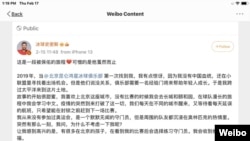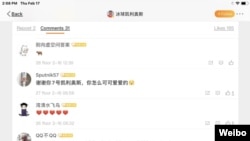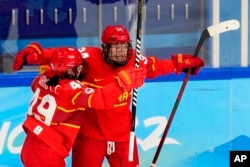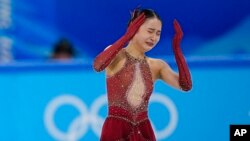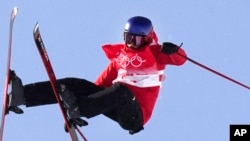China’s social media users have responded mostly positively to the sporting performances of their largest-ever contingent of foreign-born Olympic athletes, while appearing to keep mum on the sensitive issue of whether those athletes were allowed to keep their foreign nationalities.
The Chinese Olympic Committee fielded 30 foreign-born and -raised athletes in its 176-strong delegation for this month’s Winter Games in Beijing, 28 of them in its men’s and women’s ice hockey teams. The two other athletes are the highest-profile members of China’s foreign-origin contingent: freestyle skier Eileen Gu and figure skater Zhu Yi, both U.S.-born.
Eighteen-year-old Gu has won adulation in China by securing two golds and a silver, with her second gold coming in Friday’s freeski halfpipe final. Zhu did not win a medal and the Chinese men’s and women’s ice hockey teams did not reach the quarterfinal knockout stages of their tournaments.
Canadian-born ice hockey player Ethan Werek is one of the Chinese men’s team’s 15 foreign-born players, of whom 11 hail from Canada, three from the U.S. and one from Russia. Most of them have Chinese ancestry, while Werek is one of five who do not.
Speaking by phone to VOA in Istanbul on Thursday as he was en route back to North America, Werek said he had seen only positive comments about his ice hockey team role as he translated posts made on his Weibo account. Weibo is the most popular Chinese microblogging site.
“There were lots of positive messages from Chinese fans thanking me and thanking our team. I just wish I knew how to respond properly and thank them truly for the opportunity to represent China,” said Werek, who does not read Mandarin.
Werek’s observation was consistent with posts seen by VOA on the Weibo accounts of two of his U.S.-born teammates Jeremy Smith and Jake Chelios, who also are not of Chinese origin.
Goalkeeper Smith, who injured his leg in China’s 7-2 loss to Canada in Tuesday’s qualification playoff and had to be taken to a hospital, posted a Chinese-language farewell message to his fans later that day. It elicited hundreds of comments, some in English, expressing admiration for his efforts and wishing him a speedy recovery.
Chelios, a defender, had posted a Chinese message to his Weibo account a day earlier, describing his team’s initial 5-0 loss to Canada in a February 13 preliminary round group game as unfortunate and saying “we must do our best” in the qualification playoff.
“Winning or losing is not important, but you let us see the future of China’s ice hockey,” replied one Weibo user in English. “We will pay attention to you and love you.”
The foreign-origin ice hockey players likely endeared themselves to Chinese fans by respecting Chinese people and conventions, said Susan Brownell, an American research specialist on Chinese sports and an anthropology professor at the University of Missouri-St. Louis.
“They demonstrated a commitment to China just by moving there several years ago to play for a Chinese club. Under circumstances like this, I do think that Chinese people can be honored and flattered that you have chosen to represent China,” Brownell told VOA.
Brownell said Chinese fans also likely did not expect the men’s or women’s ice hockey teams to be medal contenders. They were the lowest-ranked teams in their respective tournaments and secured automatic berths by virtue of China being the host nation.
The Chinese women’s team won two and lost two of its preliminary round group games. The men’s team lost its three preliminary round group games and its qualification playoff, but its preliminary round loss to Germany was by a narrow 3-2 margin.
VOA did not observe any Chinese social media posts criticizing the foreign-origin ice hockey players, but Brownell said there is a possibility that such comments may have been censored.
Zhu, the 19-year-old figure skater, drew a deluge of harsh comments from Chinese netizens after falling during her team and single skating events, some telling her to “go back to America.” U.S. and Chinese news reports said China’s internet censors responded by blocking the Mandarin hashtag "Zhu Yi has fallen” and removing some of the most incendiary posts.
Zhu is the only one of the 30 foreign-origin Chinese Olympic athletes whom the International Olympic Committee has confirmed to have renounced foreign citizenship. She switched her allegiance from the U.S. to China in 2018.
It does not appear that any of the other 29 athletes have done the same, despite Article 8 of China’s Nationality Law saying that a person naturalizing as a Chinese citizen “shall not retain foreign nationality.” Athletes must be a national of the country they represent under IOC Rule 41.
VOA did not observe any Weibo posts discussing the sensitive question of whether Chinese authorities bent the law to allow foreign athletes to compete for China as dual nationals.
Ice hockey player Chelios told The Wall Street Journal last week that he and several of his teammates still have U.S. passports. Smith, in an interview with U.S. outlet ESPN earlier this month, said he “told China” that he would “never” give up his U.S. passport and “they said that’s fine.”
In a sign that Chinese two-time Olympic champion Gu also has not renounced her U.S. citizenship, an Olympics.com article published last year in multiple languages, ‘Five things you didn't know about Eileen Gu,’ ends with a sentence saying that she has “dual nationality.”
The “dual nationality” reference can be seen in the Arabic, French, German, Hindi, Italian, Japanese and Spanish versions of the article. It also had appeared in the English version of the article until it was removed on Feb. 9 or 10, shortly after Gu won her first gold and shot into the international spotlight. The Chinese version ends with a sentence saying Gu is “active in both China and the U.S.” rather than referring to her as a dual national.
The International Olympic Committee did not answer a VOA question about why it removed the reference from the English version of the Gu profile.
Gu has not responded directly to reporters seeking confirmation of whether she is a dual national. In a February 8 Beijing news conference, she repeated a statement that she has made before, saying that she is Chinese when she is in China, and American when she is in the United States.
When asked by VOA if he has renounced his Canadian citizenship, Chinese ice hockey forward Werek also did not respond directly, instead saying “when I’m in China, I’m Chinese.” Smith made a similar statement later when German news agency Deutsche Welle asked him to clarify his U.S. citizenship status following the Chinese men’s team’s 8-0 loss to the U.S.
U.S. news reports cited other North American-origin Chinese ice hockey players as telling reporters in Beijing that they were not allowed to comment on the issue.
“I think this is an experiment for China,” Brownell said, referring to its recruitment of the foreign-origin athletes. “If it works, then a government document declaring an official change in [naturalization] policy will come out in future,” she predicted.
Werek said he sees more work with the Chinese men’s national team in his future. Its next big challenge will be trying to qualify for the 2026 Winter Olympics in Italy, where China will not have an automatic berth as it had this time.
The disappointment of the Chinese men’s team with its Beijing 2022 result shows that it believes it can do better, Werek said.
“There were games that we could have won. So our expectation going into 2026 is that we’re going to be a team that will compete, and we’re excited for that."
This report was a collaboration between VOA’s News Center and Mandarin Service.





